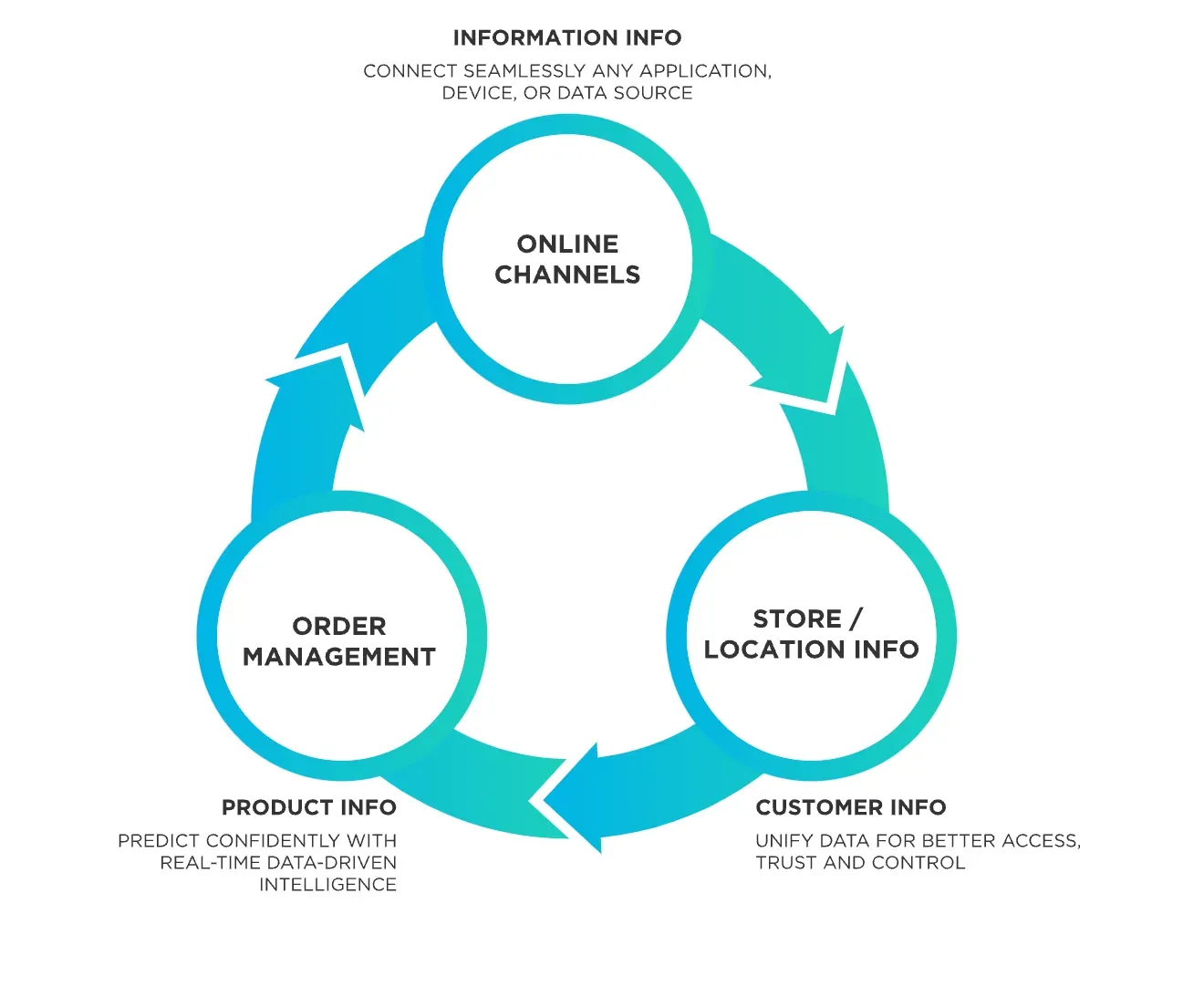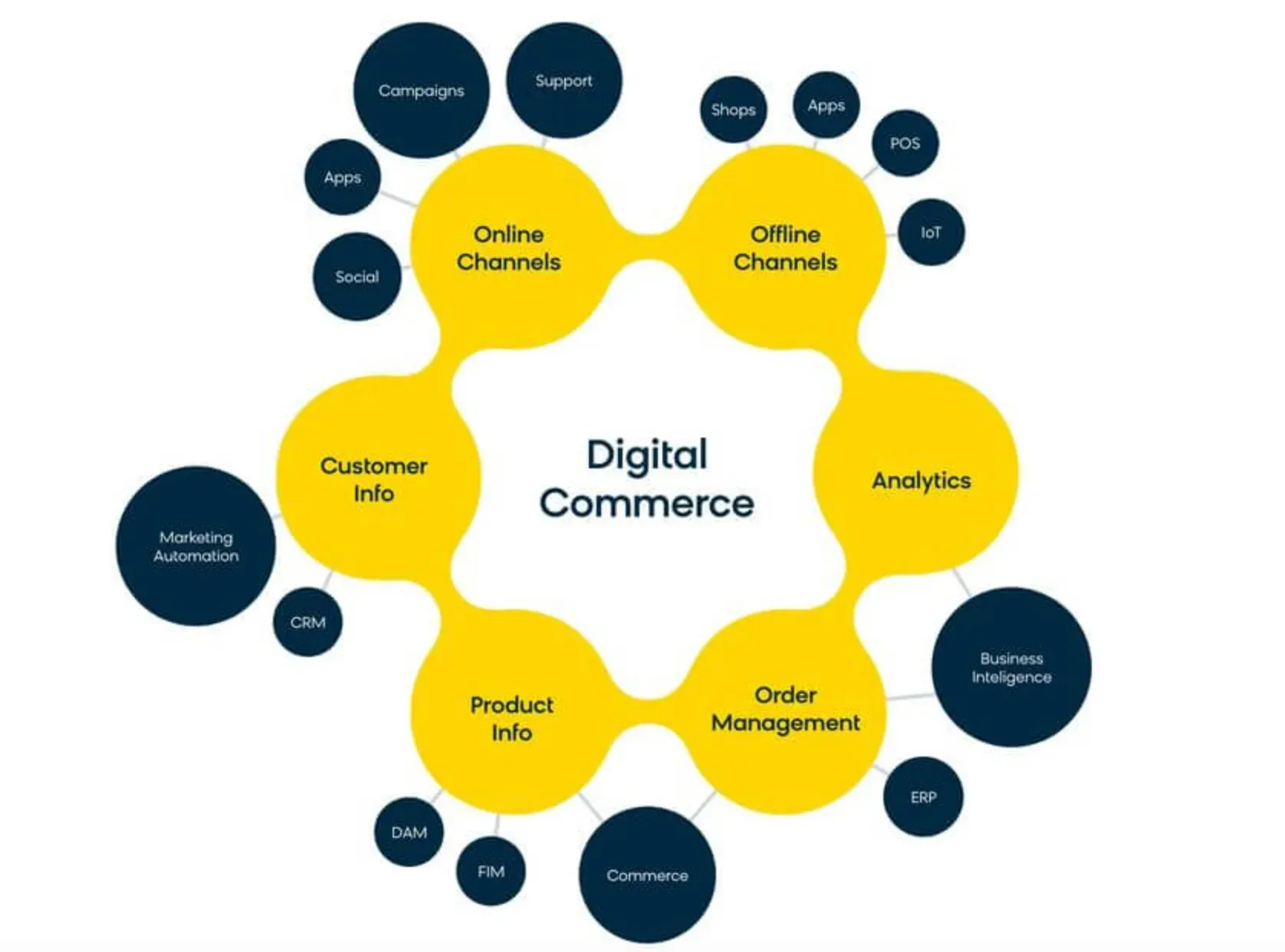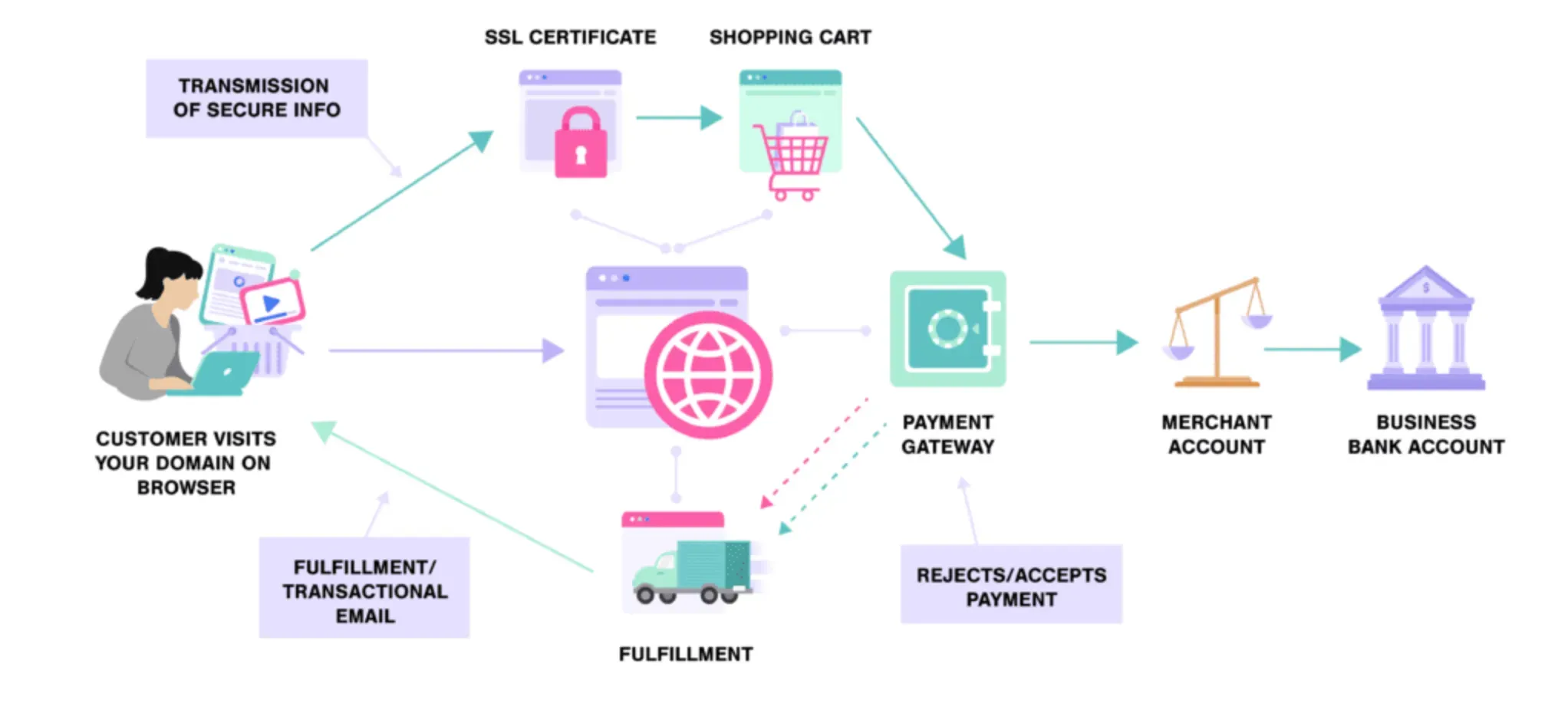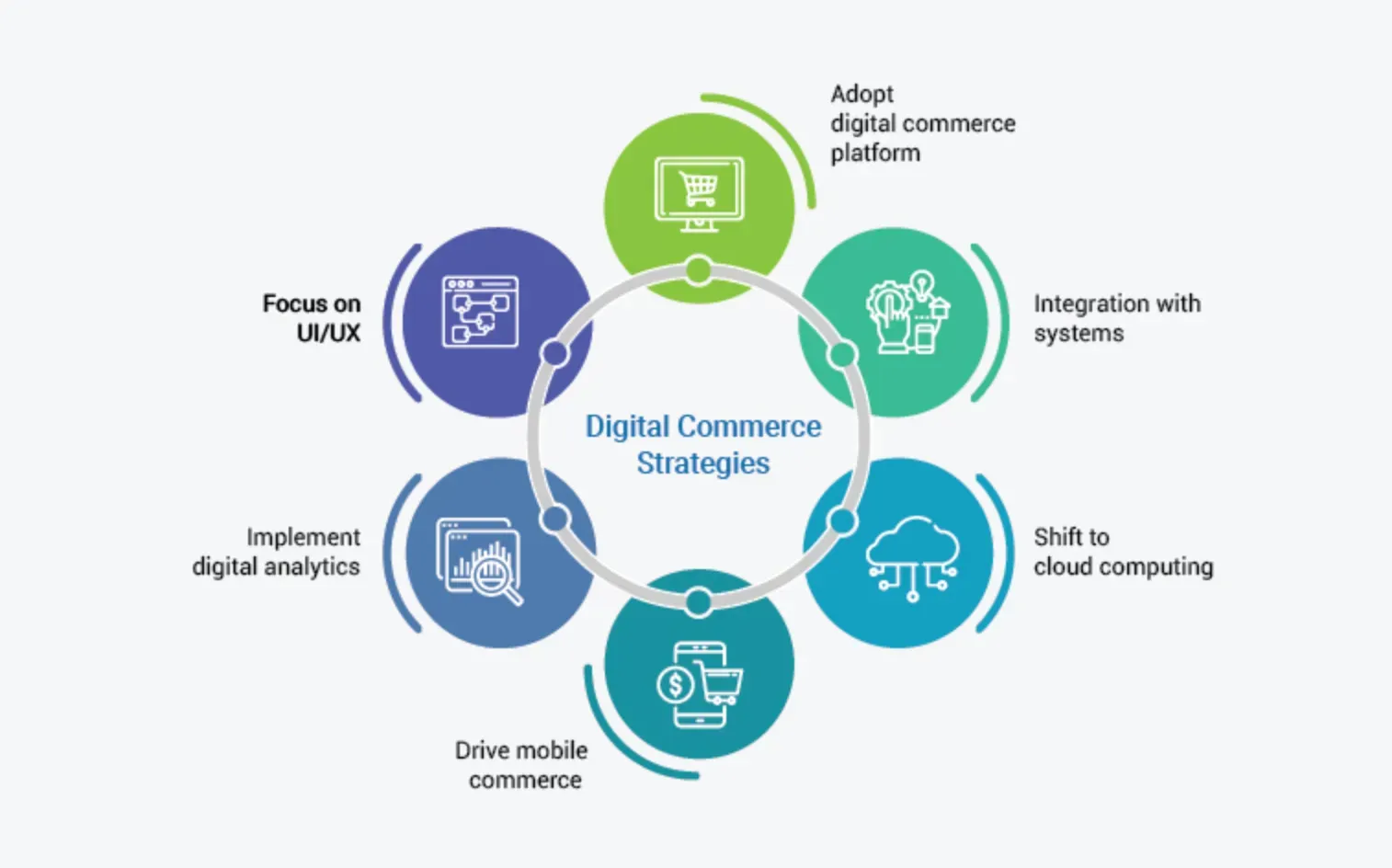What is Digital Commerce?
Digital commerce, also known as e-commerce, is the process of buying and selling goods or services using the internet. It also includes transactions involving information transfer and electronic funds transfer.
Who Uses Digital Commerce?
Everyone from solo online entrepreneurs to large multinational corporations use digital commerce. Likewise, consumers across all demographics engage with online shopping, making digital commerce universally relevant.
When Do Digital Commerce Transactions Occur?

Digital commerce operates continuously, offering the convenience of 24/7 availability. Customers from around the globe can shop, place orders, and make payments at any time that suits them.
Where Does Digital Commerce Happen?
Digital commerce happens wherever there's internet connectivity. This could be through online marketplaces, brand websites, social media platforms, or mobile apps.
Why is Digital Commerce Important?
Digital commerce breaks geographical boundaries, allows for personalized marketing, and provides rich customer data. As consumers adapt to digital lifestyles, it enhances inclusivity, accessibility, and convenience in business transactions.
What Does Digital Commerce Include?
In this section, we'll explore the key components that make up digital commerce and how it shapes today's online business landscape.

The Core of Digital Commerce
Digital commerce encompasses all the tools, technologies, and processes allowing businesses to buy and sell goods and services online.
It's a one-stop shop for an efficient and convenient online shopping experience.
Engaging E-commerce Platforms
At the heart of digital commerce are user-friendly e-commerce platforms.
These platforms provide shoppers with easy-to-navigate online storefronts, secure payment processing, and personalized product recommendations.
Harnessing the Power of Mobile
Mobile commerce has become a driving force in digital commerce.
Streamlined mobile websites and engaging mobile applications ensure that online customers have access to their favorite shops and products whenever and wherever they want.
Omnichannel Experience

A successful digital commerce strategy includes an integrated, omnichannel approach.
By merging online and offline channels, businesses can provide seamless and consistent customer experiences across various touchpoints, including social media, online marketplaces, and brick-and-mortar stores.
Leveraging Advanced Technologies
Artificial intelligence (AI), machine learning, and big data play crucial roles in enhancing digital commerce.
They enable businesses to offer personalized shopping experiences, optimize product recommendations, and forecast customer behavior patterns.
Secure and Smooth Transactions
Digital commerce includes the payment processing infrastructure that ensures secure electronic transactions.
This involves secure channels for handling sensitive financial data and effective fraud prevention mechanisms, providing customers with a safe and trusted online shopping experience.
How Does Digital Commerce Work?
In this section, we'll shed light on how digital commerce works, unraveling its main components and the mechanics behind online business transactions.

Setting up an Online Platform
The journey of digital commerce begins with setting up a virtual storefront. This could be a standalone e-commerce website, a mobile app, or a shop on an e-commerce marketplace.
Ensuring intuitive navigation, fast loading speeds, and security measures are critical in this step.
Showcasing Products or Services
Businesses then populate their online platform with their products or services. Detailed product descriptions, high-quality images, customer reviews, and pricing details are usually included.
The aim is to provide all information a customer needs to make a purchasing decision.
Facilitating Seamless Transactions
Digital commerce sites must incorporate an efficient payment system to facilitate seamless transactions.
This often includes diverse payment methods from credit cards and online banking, to digital wallets and more. Additionally, a secure payment gateway is crucial to ensure the safe transfer of sensitive data.
Considering Shipping and Delivery
Once a customer makes a purchase, the order needs to be fulfilled and delivered. Digital commerce businesses often work with logistics providers to ensure timely and reliable delivery.
Some businesses might also offer real-time tracking to enhance customer service.
Focusing on Customer Retention
After the purchase, digital commerce doesn't stop. Businesses focus on post-purchase customer service to build and nurture relationships.
Think follow-up emails, customer reviews, loyalty programs, and personalized offers—all with the aim of retaining customers and encouraging repeat purchases.
Benefits of Digital Commerce
In this section, we'll delve into the advantages of embracing digital commerce, highlighting its transformative impact on businesses across various industries and scales.

Enabling 24/7 Accessibility
One of the biggest advantages of digital commerce is its round-the-clock availability.
Unlike physical stores constrained by operational hours, online stores can serve customers at any time, from anywhere. This convenience enhances customer experience and potentially boosts sales.
Expanding Global Reach
Physical storefronts are limited by geographical boundaries, whereas digital commerce opens the door to a global audience.
You can service customers from different corners of the world, breaking down geographical barriers and greatly expanding your market potential.
Optimizing Operational Cost
Digital commerce can help in significantly reducing many traditional business costs.
Expenses related to physical stores, like rent, utilities, and maintenance, can be curtailed.
Additionally, processes like inventory management can be automated for added cost efficiency.
Enhancing Personalized Experience
With digital commerce, businesses can leverage customer data to deliver highly personalized experiences.
This includes product recommendations based on browsing history, targeted promotions, and personalized communications, all contributing to improved customer engagement and customer retention.
Facilitating Scalability
Digital commerce provides businesses with the flexibility to scale at a pace that suits their strategy and budget.
As your online presence grows, you can gauge your audience response and adapt your products, marketing tactics, and customer service appropriately, providing a pathway for controlled, sustainable growth.
Suggested Reading:
Digital Ecosystem
How do we Implement Digital Commerce?
Let's delve into how we can implement digital commerce effectively in today's dynamic business climate.

Start with a Clear Plan
Your journey to digital commerce begins with well-defined business objectives. Set your goals and desired outcomes.
Understand your customer journey deeply to create a seamless digital commerce experience.
Invest in the Right Technology
Choose an architecture approach and high-level product feature set aligned with your goals. You can opt for solutions like headless commerce, build your own, or ready-made platforms.
These can allow for an engaging and differentiated shopping experience.
Foster Test-and-Learn Culture
Enabling speed in digital commerce often requires getting a lot of things right.
A test-and-learn culture, operations for rapid response, and a customer-first commitment are critical.
Future-proof Your Investment
E-commerce has grown explosively in recent years, and it will remain pivotal in the "new normal."
So, investments in digital commerce should account for ongoing shifts in consumer habits and technological progression.
Slow and Steady
Remember, haste makes waste. Avoid rushing through the planning stage due to competitive and growth pressures. Take the time to prepare and set up your digital commerce platform properly.
Frequently Asked Questions (FAQs)
What is the difference between digital commerce and eCommerce?
Digital commerce and eCommerce are often used interchangeably, but digital commerce is broader, including activities like marketing, payment processing, and analytics, whereas eCommerce focuses solely on online transactions.
How does digital commerce benefit businesses?
Digital commerce offers scalability, streamlined processes through automation, and personalized customer experiences. It helps businesses reach a wider audience, improve efficiency, and build customer loyalty.
Where does digital commerce take place?
Digital commerce takes place on various digital platforms, including websites, social media platforms, messaging apps, and mobile applications. It is accessible from any device with an internet connection.
What is the significance of personalization in digital commerce?
Personalization in digital commerce creates tailored experiences for customers based on their preferences and behaviors. It improves customer satisfaction, engagement, and retention, leading to increased sales and loyalty.
What are the current trends in digital commerce?
Some current trends in digital commerce include the use of artificial intelligence and machine learning for personalized experiences, the rise of social commerce, and the integration of voice-activated assistants for shopping convenience.


